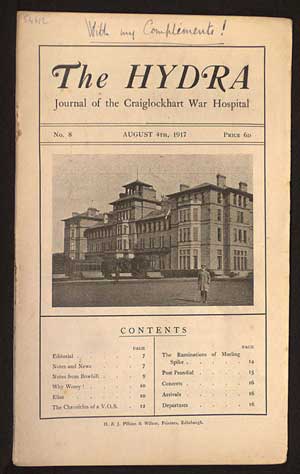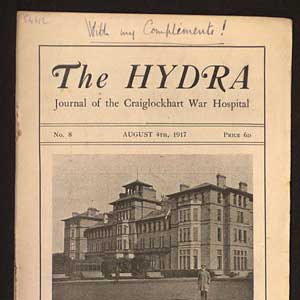 The Hydra was a journal written by patients at Craiglockhart, a World War I hospital in Edinburgh, Scotland. The hospital was for both officers and enlisted men suffering from “shell-shock” — what we’d now call Post-Traumatic Stress Disorder — with a variety of causes and symptoms. Patients included poets Wilfred Owen and Siegfried Sassoon.
The Hydra was a journal written by patients at Craiglockhart, a World War I hospital in Edinburgh, Scotland. The hospital was for both officers and enlisted men suffering from “shell-shock” — what we’d now call Post-Traumatic Stress Disorder — with a variety of causes and symptoms. Patients included poets Wilfred Owen and Siegfried Sassoon.
The institution was headed by Dr. William Rivers, a psychiatrist who used the then-novel treatment of talk therapy as part of the strategy to relieve the men of their symptoms and make them fit to be sent back to war.
[View pages of this and other issues of the journal]
Pat Barker has written an award-winning trilogy of historical fiction about the hospital and its inmates — exhaustively researched and not sensationalistic.
- Regeneration: In 1917 Siegfried Sasson, noted poet and decorated war hero, publicly refused to continue serving as a British officer in World War I. His reason: the war was a senseless slaughter. He was officially classified “mentally unsound” and sent to Craiglockhart War Hospital. There a brilliant psychiatrist, Dr. William Rivers, set about restoring Sassoon’s “sanity” and sending him back to the trenches.
- The Eye in the Door: It is the spring of 1918, and Britain is faced with the possibility of defeat by Germany. A beleaguered government and a vengeful public target two groups as scapegoats: pacifists and homosexuals. Many are jailed, others lead dangerous double lives, and “the eye in the door” becomes a symbol of the paranoia that threatens to destroy the very fabric of British society.
- The Ghost Road: The time of the novel is the closing months of the most senselessly savage of modern conflicts. In France, millions of men engaged in brutal trench warfare are all “ghosts in the making.” In England, psychologist William Rivers, with severe pangs of conscience, treats the mental casualties of the war to make them whole enough to fight again. One of these, Billy Prior, risen to the officer class from the working class, both courageous and sardonic, decides to return to France with his fellow officer, poet Wilfred Owen, to fight a war he no longer believes in. Meanwhile, Rivers, enfevered by influenza, returns in memory to his experience studying a South Pacific tribe whose ethos amounted to a culture of death.




